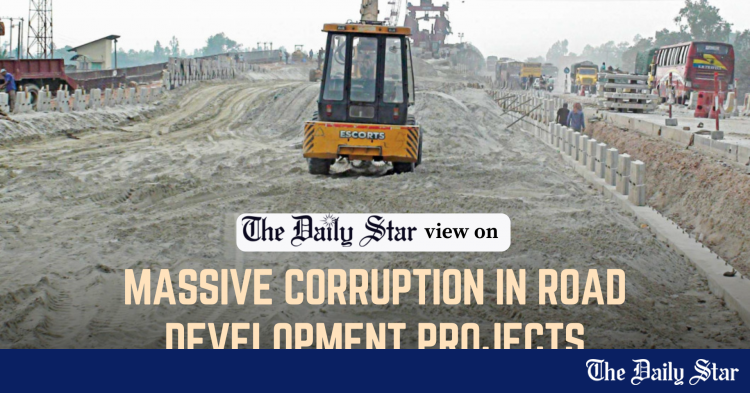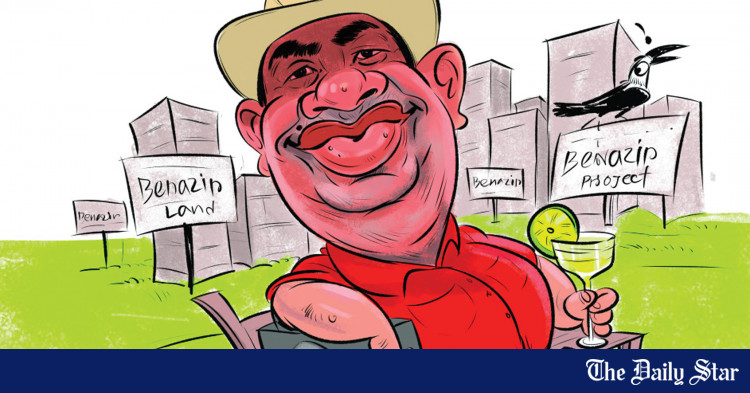Saif
Senior Member
- Joined
- Jan 24, 2024
- Messages
- 16,995
- Likes
- 8,155
- Nation

- Residence

- Axis Group


A sinkhole of corruption
TIB study reveals massive corruption in RHD projects

VISUAL: STAR
It is more or less common knowledge that there was widespread corruption in the transport sector during Awami League's 15-year rule. A recent study by the Transparency International Bangladesh (TIB) has now uncovered the extent of the irregularities that took place in development projects undertaken by the Roads and Highways Department (RHD), and its nothing short of staggering. According to the study, corruption in these projects caused a loss of Tk 29,230 to Tk 50,835 crore, or 23 to 40 percent of total project costs. This is not the full picture, but it does show how a deeply entrenched system of corruption resulted not just in inflated budgets, but also substandard infrastructure, with no one held accountable for it.
While the TIB primarily focused on domestically funded projects, its researchers estimate that corruption levels were almost similar in both foreign- and locally-funded projects. Firms reportedly paid a significant percentage of the total work order value as bribes to secure contracts, with further payments made during inspections and construction phases. And everyone involved—ranging from concerned ministers, local MPs and politicians to top officials, project directors, and those overseeing tender evaluation, procurement, inspection, etc.—got a cut. It is no wonder that initial budgets were often revised up to satisfy their greed, while the contractors got away with using inferior materials and disregarding project specifications, requiring repairs or fresh construction that would repeat this corrupt cycle.
This tripartite collusion among politicians, officials, and contractors—which frequently extended to other powerful stakeholders in the transport sector—was institutionalised over the years, forcing citizens to pay for extremely expensive projects that brought little benefits. Fast and safe mobility remains an elusive dream despite billions spent to achieve these goals. This has been once again highlighted by the Road Safety Foundation that recently disclosed that 426 people were killed in road crashes in September alone. Road safety is intrinsically related to road infrastructure. Ill-executed projects and poor road conditions, combined with the neglect of critical safety measures such as traffic enforcement, are responsible for frequent clashes and congestions.
The challenge for the new Bangladesh is to address these dual crises—corruption in transport sector and resultant suffering and casualties—with equal importance. We think the non-political, interim government is uniquely suited to break this cycle. The TIB has offered its help to identify those involved in road development corruption, which the government should accept. Going forward, there should be greater transparency and accountability in development projects to ensure public funds benefit the public. Additionally, a comprehensive approach to road safety—focusing on stricter enforcement of rules, better infrastructure, and better regulation of transport owners and workers—is essential to prevent further loss of lives.
TIB study reveals massive corruption in RHD projects
VISUAL: STAR
It is more or less common knowledge that there was widespread corruption in the transport sector during Awami League's 15-year rule. A recent study by the Transparency International Bangladesh (TIB) has now uncovered the extent of the irregularities that took place in development projects undertaken by the Roads and Highways Department (RHD), and its nothing short of staggering. According to the study, corruption in these projects caused a loss of Tk 29,230 to Tk 50,835 crore, or 23 to 40 percent of total project costs. This is not the full picture, but it does show how a deeply entrenched system of corruption resulted not just in inflated budgets, but also substandard infrastructure, with no one held accountable for it.
While the TIB primarily focused on domestically funded projects, its researchers estimate that corruption levels were almost similar in both foreign- and locally-funded projects. Firms reportedly paid a significant percentage of the total work order value as bribes to secure contracts, with further payments made during inspections and construction phases. And everyone involved—ranging from concerned ministers, local MPs and politicians to top officials, project directors, and those overseeing tender evaluation, procurement, inspection, etc.—got a cut. It is no wonder that initial budgets were often revised up to satisfy their greed, while the contractors got away with using inferior materials and disregarding project specifications, requiring repairs or fresh construction that would repeat this corrupt cycle.
This tripartite collusion among politicians, officials, and contractors—which frequently extended to other powerful stakeholders in the transport sector—was institutionalised over the years, forcing citizens to pay for extremely expensive projects that brought little benefits. Fast and safe mobility remains an elusive dream despite billions spent to achieve these goals. This has been once again highlighted by the Road Safety Foundation that recently disclosed that 426 people were killed in road crashes in September alone. Road safety is intrinsically related to road infrastructure. Ill-executed projects and poor road conditions, combined with the neglect of critical safety measures such as traffic enforcement, are responsible for frequent clashes and congestions.
The challenge for the new Bangladesh is to address these dual crises—corruption in transport sector and resultant suffering and casualties—with equal importance. We think the non-political, interim government is uniquely suited to break this cycle. The TIB has offered its help to identify those involved in road development corruption, which the government should accept. Going forward, there should be greater transparency and accountability in development projects to ensure public funds benefit the public. Additionally, a comprehensive approach to road safety—focusing on stricter enforcement of rules, better infrastructure, and better regulation of transport owners and workers—is essential to prevent further loss of lives.









































